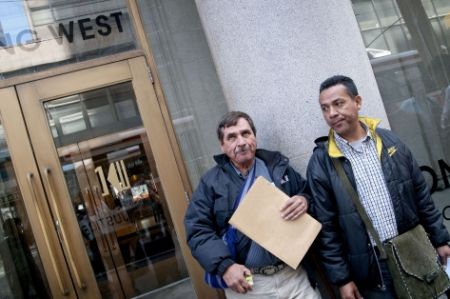A Honduran teacher and environmentalist who spoke around the Maritimes in 2009 has been arrested in his home country on what local supporters say are trumped-up charges.
Carlos Amador was one of three men detained by police on his way to work on Tuesday, on charges of obstructing the execution of an environmental plan. Arrest warrants are pending for several others.
If convicted, Amador could face 4-6 years in prison.
According to the Committee of Relatives of the Detained and Disappeared in Honduras (COFADEH), the arrests stem from an incident in April 2010 when 600 residents of the municipality of El Porvenir blocked loggers from accessing a small forest. The trees in question are part of a watershed that provides drinking water for more than 10,000 local residents.
Amador is part of the Environmental Committee of the Siria Valley, a group which has fought in recent years against the degradation of its natural environment by Canadian mining multinational Goldcorp, Inc.
The arrests are “clearly a case of criminalization of human rights defenders, yet another example of how the Honduran justice system is engaged in flagrant violations of fundamental rights,” says Annie Bird of Rights Action, a Non-Governmental Organization that works with the Committee.
In 2009, Amador spoke to audiences in Halifax, Dartmouth and other locations in Nova Scotia and New Brunswick about the effects of open-pit gold mining in his community, including water contaminated with arsenic, cyanide and mercury, outbreaks of skin disease, and destruction of agricultural land.
In May of both 2010 and 2011, he returned to Canada to attend Goldcorp’s shareholder AGM.
Bird says that the Raudales Urrtia family that claims title to the currently forested land took possession of it “through fraudulent processes” three years ago and has close ties to Goldcorp.
In that time the family has intimidated the villages in the Siria Valley with regular patrols of armed guards.
Once the land is clear-cut, it will be easier for Goldcorp to obtain permission to mine the land, Bird says.
In April 2009 then-president Manuel Zelaya proposed a law that would have imposed stronger environmental restrictions on mining companies. However, these reforms were scuttled by the military coup that overthrew Zelaya in June 2009.
Amador and the other arrestees have been released from custody under strict conditions. The Tatamagouche-based Breaking the Silence Network has asked its members to contact Honduran authorities and request that they “cease all acts of retaliation” against them, and ensure their right to defend basic human rights.



